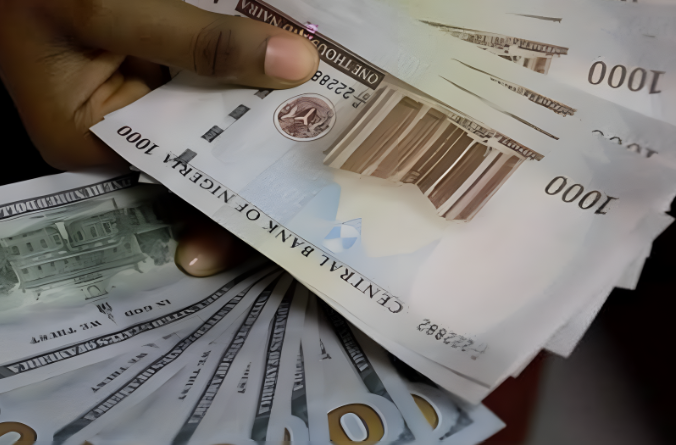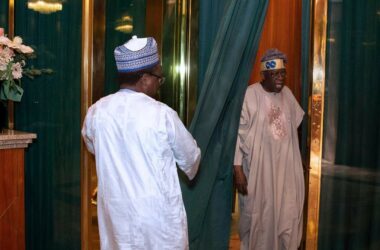Over the past few weeks, Nigeria’s local currency, the naira, has experienced a steady rate of appreciation against the United States dollar, as efforts to boost the nation’s economy are being intensified by the Federal Government, under the leadership of President Bola Ahmed Tinubu. Within the last 30 days or so, the naira’s exchange rate has moved away from the precipitous level to which it fell against the dollar, especially in the immediate aftermath of the announcement of President Tinubu’s policy of a currency floatation policy in the foreign exchange markets. While the naira is nowhere near the level at which it was at the beginning of 2023, the new rate and its general downward trajectory is a promise of relief from the myriad problems (from rising prices of essential goods, for example, to a higher cost of imports) that the Nigerian economy had to deal with.
In both the official and parallel markets, the currency has made steady gains. At the last count, the exchange rate is said to be a 12% (ie a N152.23) reduction. In the bureaux de change (BDC) the exchange rate has brought the naira to N1,117.5 per dollar.
In a country in which meaningful progress, however incremental, is a rare thing indeed, a babel of voices is already rising up with competing narratives in regard to the rise in the value of the Nigerian currency, the naira, vis a vis the US dollar. While some say the government of President Tinubu has quietly abandoned his naira floatation policy (and is now defending it instead, as successive previous administrations had done), others attribute the rise in the naira’s value to a multiplicity of positive factors – all of them to do with the way and manner the administration has nagivated the bottlenecks that have long hampered the realization of this outcome. Those bottlenecks, they say, are among the factors that led to the huge dip in our foreign reserves.
This latter group has assured Nigerians that the naira is still being floated, adding that the reasons for the recent appreciation of the naira are multifaceted.
The most important factors, it is said, are:
- a) the transfer of oil receipts from the Nigerian National Petroleum Corporation Plc (NNPCL) to the Central Bank of Nigeria (CBN). This ostensibly means that the CBN does not have to wait months (and even years) to have large inflows;
- b) The second reason, according to this narrative, is the payment of forex backlogs to commercial banks, airlines, as well as foreign merchants, etc, by the CBN – which means they do not have to source forex via banks through the I&E window or the parallel market as before;
- c) A third reason is the recent action taken against Binance, which was reportedly the chief conduit for shorting the naira;
- d) Yet another reason is the revocation of the licenses of over four thousand bureau de changes (or BDC) operators, a development which has significantly reduced the speculation against the naira. In a circular on its website some days back, the apex bank disclosed that it would sell $10,000 to each BDC at about N1,101 per/$ – while ALSO instructing them to sell at a rate NOT exceeding 1.5% above the CBN rate. This approach has had the result of somewhat strengthening the naira. One result of this development is that dollar customers are suspending the decision to buy dollars because (based on the CBN’s pronouncements), they expect the exchange rate to go further down as the days go by.
- e) Finally, the recent increase in Nigeria’s oil production from about one million barrels per day to about 1.5 million bpd, is yet another factor.
But by far the most important factor in this scenario, as far as economy watchers are concerned, is the overall policy posture of the CBN under the leadership of Dr. Olayemi Cardoso – and the confidence they are bringing back to the market. In the words of a leading banker, ‘’We now have Foreign Portfolio Investment, (FPIs) showing interest in Nigeria, and we have also seen the forex backlog cleared by the CBN. Also, we have high-interest rates, making it harder to source naira to buy dollars as before. All of these have contributed largely to the naira’s appreciation.”
However, there are those who see, behind the emerging silver lining, some pretty dark clouds. They ask whether the naira’s upward ascendancy is sustainable in the longer term. This rather sceptical view of the naira’s ascendancy is not entirely unfounded, as some have pointed to the less-,than-robust state of the nation’s balance on its reserves – a situation which makes the government’s aforementioned interventions (through its new policies on BDCs, for example, or the .7policies of the CBN) more show than substance. It is by reason of this, therefore, that these sceptics assert that it is still too early to assume that the pressure on the naira will abate in the short to medium term.
For one, the still high demand for US dollars (even if at the retail level) is an indication that, as far as many Nigerians are concerned, the naira has long ceased to be a store of value, as people look for a currency that offers a refuge for their wealth that is reasonably protected from the ravages of inflation. Recall that not so long ago, some Nigerians looked to cryptocurrencies – even when, for the most part, they were yet to grasp its rather esoteric concepts. As much as these Nigerians appreciated and applauded the Tinubu administration for its action against alleged economic saboteurs, the more urgent concern for them was for government to encourage – even incentivize – Nigerians to keep their wealth in naira by rewarding naira holdings above the rate of inflation.
But an even greater concern currently occupying the minds of Nigerians at the moment is that despite the aforementioned appreciation in the value of the naira, thanks to government’s interventions, its impact on the prices of goods and services is yet to be felt by Nigerians. According to official figures released by the National Bureau of Statistics (NBS) a few days ago, Nigeria’s annual inflation rate now stands at 33.20% in March (from 31.70% in February). Though some markets are said to have a marginal decline in the prices of basic commodities such as food items, these are still exceptions rather than the rule – and some market watchers say this is likely to be the case for some time to come. “The elephant in the room,” says one of them “is how long it will take for the policy change to reflect in prices.”
The naira appreciation, says another, mostly impacts the core inflation index first, due to the dependence of items contained in the core basket on importation. “Food inflation makes up 51% of the inflation basket, so as the food inflation continues to rise, headline inflation will also remain high.” This individual also notes that prices often increase faster than they drop, even when the circumstances influencing the direction of prices change. “In the long run,” she says, “if the FX appreciation continues, we should see some moderation to price levels, but this doesn’t happen as swiftly as one would expect.”
A number of financial experts have proffered several reasons why the appreciation of the naira has not substantially curbed inflation. One, they say, the impact of a stronger currency on inflation typically takes time to materialise, and that ‘headline inflation’ is more sensitive to food prices, which have continued to rise due to domestic issues like insecurity and high production and logistics costs. Typically, market realities (and participants), according to these experts, often react more swiftly to currency depreciation than to currency appreciation when adjusting their prices. Another factor to take into consideration is that inspite of the naira’s appreciation, international fuel prices have NOT gone down – a situation that partially negates the benefits of having a stronger naira. And as Nigeria, in spite of her status as an oil-rich economy, also imports refined fuel, she is also suffering the same fate as those those net-importating nations who rely of this resource for their energy needs.
And in Nigeria, as we all know, whatever affects the price of fuel affects EVERYTHING.
It is the fervent hope of Nigerians, therefore, that the Tinubu-led government will, while trying to mitigate the effects of its government on the lives, livelihoods and comfort of Nigerians, it will also confront the CAUSES of the disconnect between the steady appreciation of the naira and the upward trajectory of the inflation figures that are giving the masses of this country so many sleepless nights.






